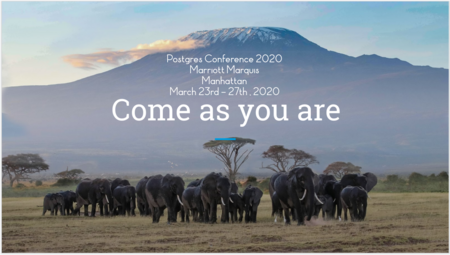Where is your path leading you?

At Postgres Conference Silicon Valley I promised during the launch that after the conference was completed PostgresWarrior and I would be taking a freedom tour to various National Parks.
For us, our path is serving the community through education and professional and personal development. This happens in many forms including these newsletters.
Recent projects have been coordinating a successful webinar series from Yugabyte, creating online live Postgres instructor lead training, and launching a new educational series on PostGIS. This is all happening while the Call for Papers for Postgres Conference 2020 now open! The ongoing goal is to allow any person to receive the education they need to be successful with People, Postgres, Data year around.
Training
The current training options from Postgres Conference can be found here:
https://postgresconf.org/conferences/Postgres-Digital-Training-Series/schedule/events
We have two performance trainings coming up in October:
- PostgreSQL Performance & Maintenance on October 29th
- Finding and Fixing Slow Queries on October 30th
Both of these training opportunities sell out at the physical conferences. They are solid content and at a reasonable price (149.00 USD ) it is hard to say no to a few hours for education in your day!
Software
Are you frustrated with the limitations and fragility of Logical Replication in PostgreSQL Core? There is a new software on the block called pgcat and it has an impressive list of features to allow your Logical Replication experience to be exceptional.
Looking for a simple script to help find tuning opportunities for PostgreSQL? The perl script postgresqltuner may just be what you are looking for. Yes, there really is an active developer community for the Perl language still.
A HyperLogLog data type for PostgreSQL from our friends at Citus. This Postgres module introduces a new data type hll which is a HyperLogLog data structure. HyperLogLog is a fixed-size, set-like structure used for distinct value counting with tunable precision. For example, in 1280 bytes hll can estimate the count of tens of billions of distinct values with only a few percent error.
Our partner Heimdall Data has been creating a new type of connection pool that removes a significant limitation within other software such as PgBouncer and PgPool. If you are looking for Enterprise Authentication (Active Directory/LDAP) as well as intelligent pooling for many users (and connections), it may be worth a look. There is a webinar next week on how it all works!
Does your path allow people to “Come as you are?”
In consideration of all of the great news from our community we can’t help but reflect on the blessings we have in the world of Open Source. Remember that Open Source is about exceptionalism, creativity, and most importantly freedom. When communities start restricting these three tenets of Open Source, they are no longer Open Source communities, even if their software is.
The theme for Postgres Conference 2020 in NYC is “come as you are” and we are asserting this mantra throughout our entire community. Over the past few years there has been an influx of toxicity throughout all circles and it is time for civility and grace to return. It is time to remember that we are all human. We all have angels and demons to our personalities. We are all flawed and we are all exceptional in our own way.
"But just because I don't agree with someone on everything doesn't mean that I'm not going to be friends with them. When I say, 'be kind to one another,' I don't only mean the people that think the same way that you do. I mean be kind to everyone."
-- Ellen DeGeneres
(Yes, this happened. No, it wasn’t planned.)
Just outside of Moab Utah.
Find YOUR path.



